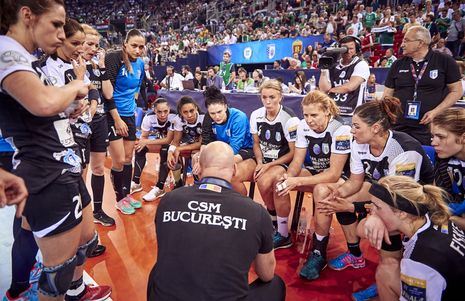

Five key factors in Bucuresti’s surprise victory
Five key factors in Bucuresti’s surprise victory
CSM Bucuresti stunned the world of handball with their astonishing performance at the Women’s EHF FINAL4, and the newly-crowned queens of handball travel back to Romania extremely happy with a perfect job done in Budapest.
It was clear from the start of the 2015/16 season that the Romanian outfit had the quality and strength to go all the way, but winning the trophy in their maiden attempt in Europe’s elite competition required not only extraordinary perfomances, but some crucial external factors.
1. Danish mastermind Kim Rasmussen
A group of good players do not necessarily form a good team. They need a top coach to forge them into such an unbeatable machine, prepare them mentally, tactically and physically to be able to compete with the best teams, and beat their rivals from a position as underdogs.
Kim Rasmussen did just that. It took some time, but CSM arrived in Budapest in perfect shape. They made the best out being underdogs and played absolutely free of pressure, which turned out to be a factor of great importance: Bucuresti players kept their nerves and equalised twice in the dying seconds of regular time and extra time.
Rasmussen, who is widely regarded as a strong option to become the next coach of the Hungary women’s national team, outfoxed Hungarians twice this season – first leading Poland at the 2015 World Championship, then with Bucuresti against Gyor.
The Danish mastermind finished fourth in the Women’s EHF Champions League Main Round, but won all games in the knock-out phase – each and every one against all odds.
2. Györ’s lack of heavy artillery
Linn Jorum Sulland is a household name in women’s handball. The Norwegian hotshot has won every major title with the national team during her amazing career, but at the age of 31 she failed to pose a real threat against the massive Bucuresti wall.
Eduarda Amorim, who is also a clutch player in defence, therefore had to take all the responsibility to score from nine meters and despite the fact that she fought like a lioness, it was easier for CSM to defend Györ’s attack.
The fast, tall Romanian team could afford to relinquish Györ’s right side and concentrate on neutralising the middle and the line – though the incredible Heidi Löke still managed to score eight goals.
Make no mistake, Rasmussen knew exactly what he was doing when he prepared his team for the final.
3. The wall: Jelena Grubisic
The Croatian goalkeeper mesmerised both Vardar and Györ’s players, putting on world-class performances over the FINAL4 weekend.
Few expected her to be even better in the final than she was gainst Vardar, but the 29-year-old goalie raised the stakes and sent Bucuresti’s travelling supporters into a frenzy, making one amazing save after another.
Grubisic was voted MVP of the tournament hands down. Though she made perfect use of her time at Györ (2014/15 season), it would be unfair to ascribe her divine perfomance to her short spell in Hungary – she was simply awesome.
4. An ’easy’ path to the final
Saturday’s meeting between Buducnost and Györ was considered by many to be the real final. The clash of the competetion’s top two teams proved worthy of the expectations – both sides gave their all, but the Hungarian squad’s extremely exhausting victory came at a price.
On the other hand, Bucuresti made beating Vardar look easy. Rasmussen’s team booked their spot in the ultimate match well before the final whistle was blown in Saturday’s second semi-final.
On Sunday, despite having a few hours less to rest, Bucuresti looked fitter when it really counted, hence their equalisers in the last seconds of both regular and extra time.
5. Bella Gullden
The top scorer of the Women’s EHF Champions League – who claimed her place at number one during the final – was not only outstanding, but extremely smart.
Gullden started the final on fire, scoring the first five goals for her team and finishing with a career-high 15 goals to her name. But the Swedish centre back did a lot more than converting penalty shots.
Though Györ’s defence shifted toward Gullden after the first 15 minutes, her clever movement opened up space for her teammates, each of whom capitalised on their chances.
Gullden scored her last goal from open play in the 13th minute but remained the key player in attack thanks to excellent reading of the game and her self-sacrificing attitude.
The Swede has been outstanding the entire season, but she proved even a top scorer can be a committed team player. That’s what you call class.






